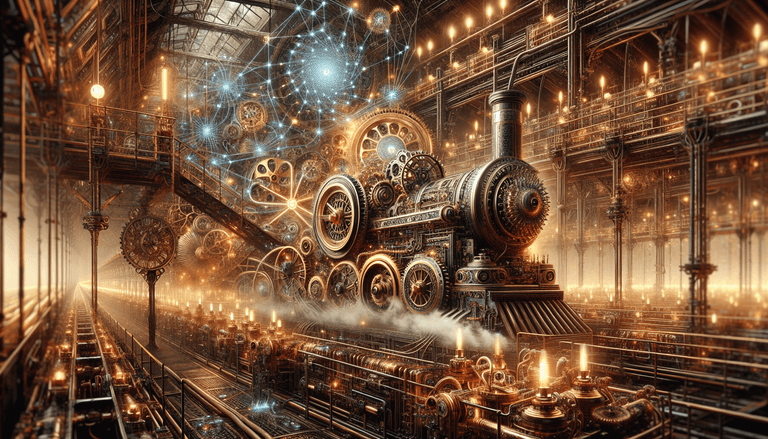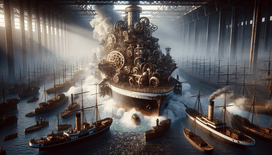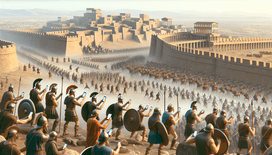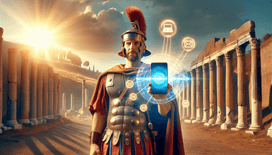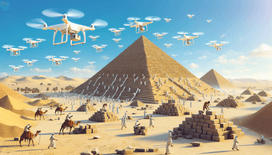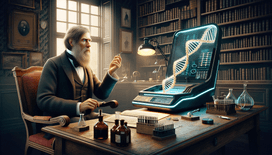Now imagine, dear readers, it's the late 18th century, a time when Britain was just gearing up for what we, in modern times, whimsically dub the Industrial Revolution. The air is thick with soot, and the streets buzz with the clatter of wooden clogs – it turns out, these were the industrial worker’s safety sneakers of choice. Entrepreneurs were having Victorian eureka moments left and right, with steam engines whistling in sync like an elaborate kettle orchestra.
But what if I told you that there was a twist in the bobbin of time? What if our industrious forebears found themselves upon the spools of a digital web, armed with none other than our modern darling of disruption: artificial intelligence? The looms of fate could have spun an entirely different fabric of history, perhaps one woven with a WiFi-powered warp.
The Rise of AI in the Age of Steam
Let’s play with the idea that Babbage and his analytical engine had crunched numbers the way some folks crunch their breakfast cereal these days. Imagine if Mr Richard Arkwright, that visionary inventor and textile tycoon, had access to AI. Arkwright's cotton-spinning affair could have become Britain’s first smart factory. Picture spinning jennies outfitted with AI-powered controls; algorithms predicting spindle wear and tear better than your local weatherman predicts rain. Automated chartists would be plotting the daily yield faster than a weaver could say "industrial action."
Arkwright might have faced off with AI-anointed Spinning Neo-Jennies – robotic looms that whisper sweet patterns nothings into your ear. R&D departments might well have birthed the first line of cotton couture – a concept as foreign to the 18th-century mill worker as Snapchat is to the modern grandparent.
AI-fuelled Connections Across the Empire
As the Empire on Which the Sun Never Sets gathered pace, it’s conceivable that AI could have powered a nautical network, forecasting Solent squalls and predicting potential tea turbulence from India. Imagine a ship’s captain checking their 18th-century version of 'Cortana' for an update on whether the next port had a sudden influx of umbrellas due to AI-enhanced weather predictions gone awry.
With AI nudging the realms of logistics, the Royal Mail coaches, often stumped by fog as thick as a Dickensian plot, might have run to precision times. The hooves of horses would clop in time with algorithmic pings, as ubiquitous as today’s smartphone notifications. Sorting stations would buzz with AI-driven organisation – the forebears of modern-day robotic arm-facilitated warehouses.
A Jolt to Engineer's Ingenuity
Notably, a young Mr. George Stephenson, the 'Lord of Locomotion', would have found his Rocket quite literally turbocharged with technology. The judicious application of AI could mean trains running on time – a thought to make any commuter’s heart leap as though fuelled by an engine of pure happiness.
Stephenson might have observed AI’s ability to iron out inefficiencies with an awe that mirrored the moment Alan Turing first saw a computer recite Shakespeare sonnets. AI-added locomotion could reduce wasted wattage, bring about eco-transportation a century ahead of schedule, and perhaps even prevent the age-old problem of trains mysteriously stopping somewhere around Newcastle.
The Downstream Innovators
Let us not forget the impeccably powdered wigs of the political sphere. AI couldn’t deny Prime Minister Pitt with an augmented reality of national economic health. Shrewd strategists could model the impact of policy decisions in real-time. Perhaps AI would help avert pitfalls, like the overt taxation mishaps that led to those pesky trespassing tea parties on the other side of the Atlantic.
Final Reflections
Of course, with every revolution – whether industrial or electronic – there comes upheaval, and this AI-infused industrial saga would be no different. Jobs lost to Spinning Neo-Jennies or AI-driven mariners might have incited political strife. However, as history tells us, humanity is an adaptable lot, likely trading tales of old skills the way we now exchange retweets.
So, dear historians and techno-futurists, while our world remains free of textile AI and steam-powered Google Doodles, it's always delightful to muse on what might have been.
